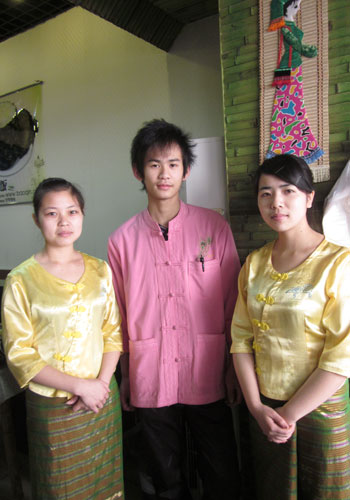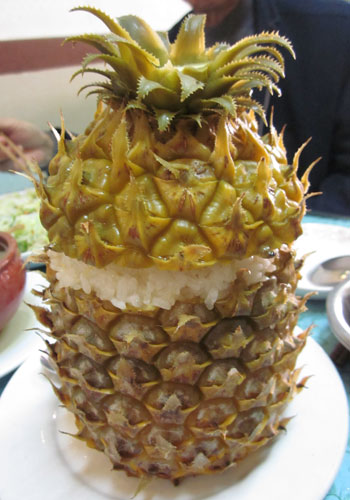Escape to the tropics: Dai restaurant in Beijing
|
Baoqin Daiwei Restaurant's staff in traditional Dai dress. [Photo:CRIENGLISH.com] |
|
The Pineapple Sticky Rice is served in a hollowed pineapple. [Photo:CRIENGLISH.com] |
The restaurant's steam pot chicken has more neutral flavoring, with the broth reminiscent of western home-made chicken soup. But, the soup is not what draws western guests to this restaurant; Ma Shoubing noted that his restaurant's fried potato balls are particularly popular among his foreign guests, with many groups having to order more than one heaping plate of them.
While Ma Shoubing admitted he has toned down the intensity of the flavors just a bit for Beijing tastes, he has found other ways to bring the Dai atmosphere to his restaurant. The dining room is decorated with green bamboo, and the beverage bar near the front resembles a tiki bar. The chopsticks are made of reusable bamboo; they are washed and boiled at the end of the day.
The staff all come from Dai villages in Yunnan; Ma Shoubing travels to the province to recruit staff for his Beijing restaurant. The servers all wear Dai ethnic costumes consisting of long, silky skirts, and in the warm weather, yellow short sleeved blouses.
To round out the decorations are wall photos representing the Dai minority. The largest photo in the restaurant, however, is actually of Zhou Enlai, the first premier of China, meeting a group of students in 1958. One of those students is owner Ma Shoubing. While he was a student at Minzu University, he was chosen as a Dai representative to meet Zhou Enlai during an official visit. At that time, Ma Shoubing was unaware that a photo was taken. In 1977, a year after Zhou Enlai's death, a Beijing museum held a memorial photo exhibition. An old teacher of Ma Shoubing attended the exhibition and was surprised to find his former student in a poster-sized portrait of Zhou Enlai. After hearing of the photo, Ma Shoubing was able to track down a copy for himself.
The restaurant bustled with local professionals during lunch hour, and Ma noted that the restaurant can serve up to 200 guests a day, more on weekends. He currently employs about 20 staff members, including 4 cooks who have been trained in-house. However, he has no plans to expand or open any branches. He says he's not concerned about how to make the most money, but how to improve the dishes offered by the restaurant.
The prices of Ma Shoubing’s dishes are extremely fair, considering the generous portions of quality food. Prices range from about 10-50 yuan, with the majority of dishes falling between 15-30 yuan.
The Baoqin Daiwei Restaurant may be out of the way for many Beijing residents, but the owner is friendly and the dynamic southern flavors are worth the trip.
 0
0 








